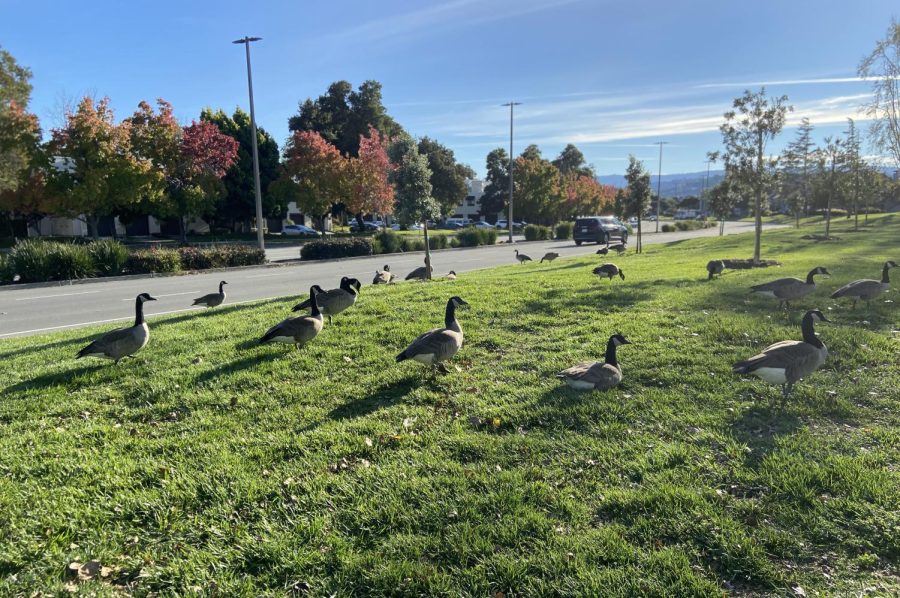Silicon Valley. The textbook example of a utopian society that’s home to identical rows of houses, perfectly cut grass, and beautiful wildlife.
But apparently, not all wildlife is deemed beautiful enough to keep in the area. The Bay Area residents have made a common enemy over the years with a species so vile, they can hardly stand the idea of co-existing in the same parks: Canadian geese.
What’s even worse? These animals poop.
This has left Foster City with no other choice but to exterminate a third of its population. In July 2022, the U.S Fish and Wildlife Services granted the Foster City Council a permit to legally kill 100 geese. In an interview with The Mercury News, San Mateo County Board Supervisor David Canepa estimated the project to be “at a total cost of $100,000 to $250,000.”
So rather than spending their money on actually important issues such as homelessness, public schools, or animal shelters, the government will give thousands to protect their picture-perfect lawns.
According to the Foster City website, the population has almost doubled from 181 geese to 323 in the span of one year. There is no denying that the overpopulation of geese is a problem, but the ways in which Foster City is planning to address the issue are where it gets messy.
The justification for the killing is that they are a health hazard since they carry diseases such as E. coli. This is true for most animals in general, especially birds, so why are geese being treated any differently?
The answer lies in the earlier definition of the Silicon Valley utopia. The geese have become unattractive to look at because they are no longer a unique sight to see such as swans or sandpipers. So when looking at the problem from a close-minded perspective of a homeowner with a perfectly trimmed lawn, killing 100 geese actually seems like an effective solution.
But animals have evolved specifically to reproduce and keep their species alive, meaning that the goose population will fill out over time and continue growing exponentially. Then what? Then another permit will be granted and 100 more geese will die.
This is a temporary solution. It is unethical because it fails to address the root of the problem. The Foster City Council is pulling out just the top of the weed in order for their garden to look more pretty.
Think back to the Silicon Valley neighborhoods. The well-kept grass and public parks are not only eye-catching for California residents, but for geese too. The whole reason why they have become overpopulated is that the Bay Area is the perfect habitat for them. The geese no longer have a reason to migrate when the seasons change because they have all their resources given to them by the city councils who have created these utopias. In this sense, the geese are not so different from the people.
So what is the proper solution then? The reality is that there is no perfect plan that is going to create an orderly society where everyone is happy. But the Earth and its wildlife deserve at the very least for humans to put in the effort to make ethical decisions that will preserve natural resources.
One of the most common ways in which neighborhoods keep birds and other animals out is by implementing bright lights or sounds that go on at night, which is something that geese are sensitive to.
However, the answer may lie in the grass itself. The short-cut grass that has been planted everywhere around Bay Area parks is a goose’s favorite food. They prefer this type because they can see if a predator is coming towards them, so they feel safe in this environment. If residential areas were to replace this grass with types with longer blades, they would already become less desirable for geese to stay in.
In addition to this, many types of long-bladed grass require less irrigation, and thus the cost of water would be less. They do not need as much maintenance either, since the grass can be grown out for longer periods of time, meaning that the government would pay less for lawn mowing.
If the city councils are worried about the physical appearance of this solution, they can be reminded that it would be a prettier sight to see than the 100 geese in line to have their spines snapped in the spring.
While the Canadian geese may not be the most friendly or cute animals to look at, they still contribute to biodiversity and spreading seeds for different ecosystems.
Planting new grass in public areas is a great way to deter the geese from Bay Area communities by eliminating their main food source, and the best part, it benefits the environment.
While this may be a perfectly logical solution to environmentally conscious readers, unfortunately, people in power are often drawn to ideas that are quick and simple. The Foster City Council members can be contacted through this website, where people should encourage them to change their angle on how to deal with the geese.
While saving 100 geese may seem like somewhat of an irrelevant problem compared to the planet slowly deteriorating, the concept of the issue is reflective of humanity’s negative impact on Earth, therefore this could be the first step into making more environmentally ethical decisions.






















